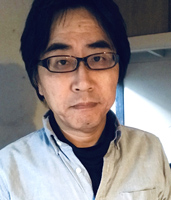AI and censorship Akio Nakamata (writer/editor)

Rie Kudan’s ”Tokyo Sympathy Tower” which won the Akutagawa Prize in the second half of 2013, has become a hot topic. The reason is that the author has publicly stated that part of the text of the novel was created using generative AI. Moreover, this is not just a gimmick; it is deeply connected to the theme of this novel.
The main character of this novel is an architect named Sara Makina. As the last name Machina suggests, Makina is a character who is both human and mechanical.
In the world depicted in this work, the trend of ”Japanese people wanting to abandon the Japanese language” is extremely emphasized, and the building she is competing in is named
”Sympathy Tower Tokyo” and is housed in this facility. The prisoners who are subjected to this crime are also referred to as ”Homo miserabilis”.
The phrase that seems to have been created using generative AI first appears when Makina asks an interactive AI called “AI-built” about the concept of “Homo Miserabilis”. It is ”a relatively new concept proposed by sociologist and happiness scholar Seto Masaki,” and ”people who have traditionally been called ”criminals” and have been discriminated against, as well as inmates serving time in penal institutions.” It is said to refer to juvenile delinquents and express a sympathetic viewpoint, such as”pity” ”poor” regarding their origins, circumstances, and personality.
Sentences generated by “AI-built” will often appear after this. It is no wonder that the author actually used AI to create an “AI-like” feel. However, Makina in the story has negative thoughts about AI, and has the following impressions regarding this sentence. “The reason why AI is so good at putting on a smart and polite appearance is probably to hide the fact that it is actually a fatally illiterate flaw. No matter how good its learning ability is, AI does not have the strength to face its own weaknesses. They are so accustomed to stealing words that they are innocent, they neither question nor feel ashamed of their ignorance”.
As you read on, it becomes clear that the true theme of this novel is “censorship.” The trend of demanding rephrasing of katakana words is a kind of self-censorship that has internalized so-called “political correctness,” and words in a society where such paraphrasing is automated are as deadly as sentences produced by generative AI. This work argues that it shows a lack of literacy.
What is currently progressing is the automation of human consciousness and thinking, and the creation of literary works such as novels is not free from this situation. Another character says this in the story. ”For some reason, I felt a kind of pity for the sentence construction AI (Omitted) I don’t know what the sentences I create by splicing together other people’s words mean or who they are communicating to. I sympathized with her, thinking that a life where she had to keep lining up the letters she was given was a very empty and painful life”.
”Tokyo Sympathy Tower” is not a ”novel written by AI” but rather a critique from the deepest point of view of a society where such novels are increasing in number.
